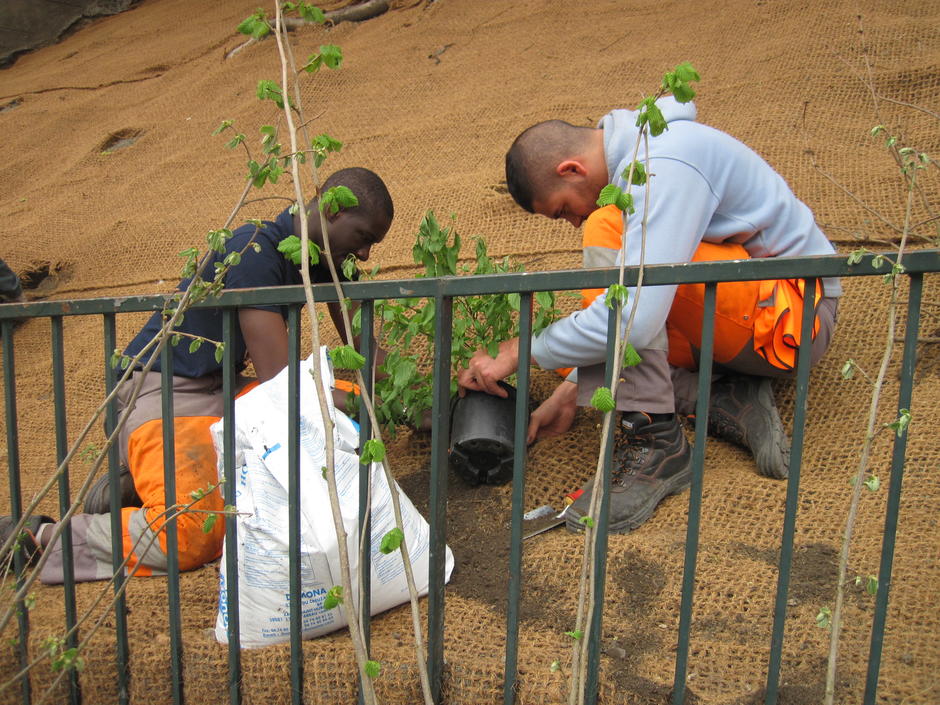
Social and Employment
Place
Meudon, France
Grant(s)
€16,000 to the Selection Committee at 2010/03/30
€15,000 to the Selection Committee at 2014/10/17
Project leader
The nonprofit Espaces was created in 1994 to attempt an experiment that was highly innovative at the time: the ecological management of the degraded or poorly maintained urban fabric in the Paris region, using environment-friendly techniques and offering work to long-term jobless persons. The effort was crowned with success. Espaces today welcomes and counsels 141 back-to-work employees (long-term unemployed, welfare recipients, handicapped workers, etc.) in its 13 worksites in theHauts-de-Seine, Yvelines and Paris districts.
Differentiated management of the vegetation
At the core of its back-to-work projects, Espaces has adopted an exemplary approach in favor of biodiversity and the environment with differentiated management of the vegetation. This management method takes account of environmental conservation in the creation and maintenance of public and collective open spaces, the use of the area, the safety requirements and the life cycle of the plant species. The worksite teams select local species adapted to the climate and the soil, use no plant health products and chemical weed killers, and compost the green waste on the spot. Composting boxes are systematically created on each site, minimizing the import and export of biomass and carbon emissions. And differentiated management preserves the social and recreational role of the natural spaces by limiting noise during the operations.
Moving people around ecologically
The movements and lasting mobility of the back-to-work employees are one of the foundations of the success of Espaces' back-to-work projects. Since its inception, during recruitment campaigns, it privileges proximity between workplace and residence. The various technical premises are located nearby and accessible by public transport, and the worksite equipment is stored on site. Soft transportation methods are preferred (walking, bicycles, scooters, rail cycles, public transit) in order to limit the nuisance factor of motor driven vehicles.
Growing travel requirements
And yet, as the nonprofit grows, the teams of the back-to-work projects are required to travel a steadily expanding territory. This raises the problem of transporting bulky worksite materials and equipment as public transport systems increasingly restrict access to professional articles. The nonprofit resorts to renting vehicles whenever necessary. And this is happening more and more.
It is therefore initiating a program to acquire an electric utility vehicle, additional scooters and rail cycles, as well as worksite equipment (brush cutters and grinders) in order to continue to expand this activity. This program is specifically aimed at 30 environment workers and 4 technical staff working on a site that is being created for the upkeep, management of open spaces and the refurbishing of small buildings in the stations of Beynes, Villiers-Neaulphe-Pontchartrain, Montfort l'Amaury-Méré, Garancières La Queue (Yvelines) and three back-to-work projects of the biodiversity sector.
Projects all over the Paris Region
The first, the Talus ferroviaires aval - downstream railroad embankments - back-to-work project, operates on a territory 24 km log, maintaining 4 km of embankments and approaches of railroad stations in the Hauts-de-Seineet and Yvelines districts. The back-to-work team carries out cleaning and ecological management of the sites as well as biodiversity and landscape enhancement.
The second, the Petite ceinture 15th-14th-17th project, maintains and enhances 5.8 km on an outlying area of about 10 km between the 14th and 17th districts of Paris, passing through the heart of Paris. The environment workers carry out daily cleaning of the tracks and embankments and are also in charge of the nature walk located in the 15th district between Place Balard and rue Olivier de Serres.
The third, the Espaces verts and naturels 16th-15thback-to-wok project, maintains the section of the old Paris Petite ceinture railroad that runs from porte d'Auteuil to porte de la Muette, today developed as a nature walk open to the public. It is also in charge of regular maintenance of several spaces in the 15th and 16th districts of Paris.
Equipment and clean vehicles for nature spaces in the Paris Region
After having supported Espaces in 2010 for the ecological management of a technical area in Meudon, the Veolia Foundation happily contributes to the development of this nonprofit, which is recognized both in ecological engineering and workforce development for people in difficulty.

